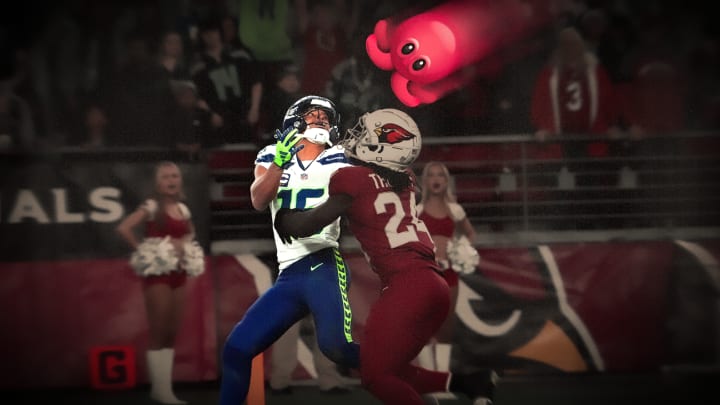Tyler Lockett Wins 2023 Octopus of the Year Award

“No, I hadn’t heard of it,” Tyler Lockett told me over the phone earlier this summer. “But it sounded cool when [Seahawks PR staff] were talking to me about it a little bit.”
It, in this case, was the octopus. And, yes, I am still waiting for the first NFL player to tell me they had heard of it before scoring one in a game.
“It is one of those types of plays that do go unnoticed, because the two-point conversion doesn’t count, realistically, toward our stats.”
Well, Tyler, have I got news for you.
Welcome back to what I call the MMQB’s most self-indulgent award show: the fifth annual Octopus of the Year column. It’s hard to believe, but this is now the sixth consecutive offseason I have written about my baby. As always, we’ll back up for those who are new here and currently looking around very confused.
In 2019, I introduced the octopus, a stat when a player scores a touchdown and the ensuing two-point conversion on the same drive. I thought that might be the end of it, but I have chronicled in subsequent offseasons how it took off far more than I expected, becoming a Super Bowl prop bet and sneaking its way into the mind of a few broadcasters. In the past few offseasons, I’ve spoken to Cam Akers, Mark Andrews and Jalen Hurts so they could formally accept their award.
This summer, Lockett was game. His moment: Week 18, a must-win for the Seattle Seahawks in which they needed to beat the Arizona Cardinals, and hope the Chicago Bears could come away with a win or tie against the Green Bay Packers.
“I think there was a lot of scoreboard watching going on,” Lockett says about that day. “To each their own. For me, I was scoreboard watching, just trying to see what could happen. There may have been some other people who felt like they shouldn’t do both. But, wholeheartedly, I think we all did what needed to be done for ourselves to still play at a high level.”
I get it. Some of us scoreboard watch for a living.
Lockett scored those eight points with 1:54 left, securing a win, even though Seattle ultimately missed the postseason. His feat was rare: It marked only the seventh time a team trailed by exactly seven points and then a single player scored eight to take the lead. And it was only the fourth time those were the final points of the game, resulting in a one-point win (the others: Eddie Royal in 2008, Mike Williams in ’18 and Jordan Akins in ’23).
How could I possibly dig up that factoid? There is only one place to look.
I don’t know what your definition of history is, but in my mind the modern approximate for the official historical record is the Sports Reference family of sites. I sang Pro Football Reference’s praises in 2019 when I wrote the original column, as the site’s very helpful researchers were able to dig through their data and give me the list of the 140 octopi recorded before I had officially named it (technically I named it on Twitter during the previous season). I took that data and teased out all sorts of fun facts: players with the most in their career, the first one in the playoffs, etc.
Since then, I have fancied myself the official keeper of the octopus, manually updating my tally each summer. Now I’ve got some help on that front, and it happens to come from a site I check roughly 30 times a day during football season.
“We try to document as much history as we can, as accurately as we can and as in-depth as we can, too,” says Mike Lynch, the director of data who has been with the company over 10 years. “This sorta thing gets at why a lot of us like sports. It doesn’t necessarily mean anything, but it’s fun. It’s a record of things that happened on a field.”
This is not out of the ordinary for a site that has an entire section labeled Frivolities, which for NFL recordkeeping includes tracking all touchdown passes thrown by non-QBs or scored by non-skill-position players.
So adding the octopus tracker felt like a natural extension, though it did involve cleaning up some data. Much of the site’s trove of information is pulled directly from APIs, which is how box scores and basic stats update daily. Lynch likes that the site also invests the time needed for manual research and data vetting.
I asked Lynch for an example of a similar project and he recalled compiling a list of every buzzer beater in the history of the NBA and the ABA, which he says, “required reading newspaper stories or looking for YouTube videos of every close game that was ever played, to figure out whether the game ended with no time left on the clock.”
Suddenly my request doesn’t sound so daunting.
“There’s things that we have that you could find anywhere. And then there’s things you could find on our sites that you couldn’t find anywhere else. The frivolities, where the octopus is, is a great example of these sort of fun things that I think help make our site special for certain users.”
During that process, I went back and forth with Sports Reference staff, including founder and president Sean Forman, looking for discrepancies in each other’s numbers. I discovered a mistake in mine that requires a mea culpa. I missed Noah Fant’s octopus in Week 2 of the 2020 season, which was then missing from my past three offseason roundups. This feels just like when a researcher discovers some baseball player from the 1930s actually had one more RBI than everyone thought. The only difference is this took place four years ago and Scott Hanson mentioned it on RedZone when it happened.
But the good news is that I won’t miss one again. Anyone who wants to know about any NFL octopi (if they’re not following my handy Twitter Bot) can log on to the Pro Football Reference site that generally updates between 7 and 8 a.m. ET every morning. That’ll make it a lot easier to track your own fun facts or keep track of anyone else matching what Lockett did in Week 18.
“I think that’s a great feeling man. Just knowing that it’s only been done seven times. There’s been a lot of football, when you look back on when the NFL started. I’m thankful for that opportunity, and to be a part of it, a lot of people don’t get that opportunity to be a part of it.”
But now that Lockett knows he’s part of octopus history, does he want to be an even bigger part of it? If he scores a touchdown and the team lines up for two, would he ask Geno Smith to hit him again?
“Ha! Well, I mean sometimes you just gotta let it play itself out.”
Truth is, he didn’t know the ball would be coming his way on the touchdown or the two-point conversion in Week 18.
“Sometimes as a receiver, you don’t really know why we may be running a certain type of play,” Lockett says. “And so you’ve just got to be able to do your part of the job, because if they play a certain coverage, we’re gonna end up throwing DK [Metcalf] that ball. If they end up playing a different coverage, we’re gonna throw Jax [Smith-Njigba] that ball, running across the other side of the field.”
Lockett scored a 34-yard touchdown, which he caught on a deep post.
“They ended up playing a two-high coverage, so that works perfectly when you’re about to throw a post to the outside receiver. So, luckily, I was just able to run my route. Because a lot of times in the league you can get so caught up in thinking you already know who’s gonna get the ball, and so you don’t run your route to win. But you gotta run your route to win because, regardless of what play is called, the quarterback is gonna still pick and choose who he’s gonna throw it to based off the coverages. And that’s what I did. I just ran the route to win, and once I saw the ball in the air, I just adjusted and was able to make the play.”
And then on the two-pointer, he was actually the last option. But the Cardinals vacated his spot in the end zone, leaving him wide open to wait for the ball. So much of football, from two-point conversions to sometimes playoff berths, comes down to the situation you find yourself in and what happens that’s outside of your control.
“But it would be really cool if we were able to do that and I was able to get another one.”
Yes, it would.
Elsewhere in octopus
It was a fun year for the octopus, with 11 of them in all, the most in a season since 2020. And that’s not even counting the UFL!
Adam Thielen and Travis Etienne joined the club of now 30 players who have multiple in their careers. Two were on Monday Night Football (Thielen and Jerome Ford) and two were on Thanksgiving (David Montgomery and CeeDee Lamb), which makes four Turkey Day octopi over the past four years. Between Lamb and Zay Flowers, the list includes both flora and fauna. And Breece Hall’s in Week 18 was the first ever given up by the New England Patriots, so now all 32 franchises have allowed one.
Each year I keep track of which announcers mention the octopus on TV (it helps that I get a significant number of tweets and text messages whenever it happens). Mike Tirico became the first to call one during a prime-time game, when he mentioned it after a Stefon Diggs octopus on Sunday Night Football in Week 9.
.@miketirico welcome to the movement! I believe he’s the first broadcaster to shout out the octopus during a prime-time game ✊🐙 pic.twitter.com/bbOc6Si0rX
— Mitch Goldich 🐙 (@mitchgoldich) November 6, 2023
The play also put us on the NFL’s official YouTube page:
We’ve also made the NFL’s official YouTube page 👀🐙
— Mitch Goldich 🐙 (@mitchgoldich) November 6, 2023
(h/t @by_JBH) pic.twitter.com/YEHZO6RCHf
A few weeks later, Tirico was on my colleague Jimmy Traina’s podcast talking about the types of things he thinks about during a game, and he brought up the octopus unprompted (I clipped that part here).
Scott Van Pelt does not regularly call games, but when an opportunity arose during the Pro Bowl Games (!), he met it.
And in a personal favorite moment: Andrew Catalon and Tiki Barber were on the call for Calvin Ridley’s octopus in Week 12. Catalon is an official friend of this column, and when he brought it up on the air, it was clear Barber had no idea what he was talking about. No shame in that, except Tiki had one in the fourth quarter of a 2005 game that tied the score 21–21 in the fourth quarter! Maybe someday I’ll mail them all certificates.
Finally, our handy new octopus tracker on Pro Football Reference does not list which players have multiple octopi, or how many each team has, which means I can still offer some value in this space. Here are the players with multiple:
And by team:
